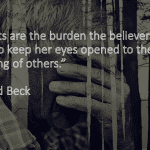The Handmaid’s Tale returned with a new season that picks up where last season’s finale left off – which is also where, apart from an epilogue, Margaret Atwood’s novel left off. And so the new season (and any future ones that may follow it) have fewer constraints. For those who know Atwood’s novel well, this may be exciting, worrying, or a bit of both, depending on how one feels about how one has filled in the rest of June Osborne’s story in one’s own imagination.
Before watching the episode, I had seen many people talking about it online as “brutal.” After watching, I understood why. The episode explores the nature of terrorism, the cost of freedom, and the no-win situations that oppressive regimes place their victims in.
Religion plays a powerful role in the episode, essentially from the first moments. June is taken with the other rebellious handmaids to a stadium where gallows have been set up. The viewer realizes that this is a ridiculously convoluted mode of execution, since the stands are not packed with crowds of viewers, and between that and the likelihood of June’s survival, we expect this to not end with her death. The authorities are using fear to try to extract obedience, and perhaps even piety as they understand it. And June does indeed appear to pray as she stands with her head in a noose. But when the deception is unveiled, and Aunt Lydia chastises the handmaids for having failed to obey God and God’s servants on earth, we hear June’s prayer that she expresses in her thoughts: “Our Father in heaven…what the actual fuck?” If there were ever a circumstance in which such a prayer might be appropriate, it is this one.
Later, Aunt Lydia further reprimands the handmaids, accusing them of having heard the will of God and yet decided that they know better than God. She says that there are two kinds of freedom – freedom for and freedom from. They used to have the former, which is anarchy. Now they have the latter, which she says is a gift from God. This approach to freedom is actually a central part of religious ethics in more than one tradition, and it is not entirely off base. One is free to take drugs, but then one loses the freedom to quit whenever one wants to. One is free to indulge one’s appetites and yet there are consequences which will then impose their constraints. The issue is not this distinction, but the use of it to justify authoritarianism and oppression. We see this in many patriarchal religious and cultural settings, in which veiling or not going outside is depicted as freedom from the ogling stares of men, objectification, and the threat of molestation. But in that case, a better solution would be for the men to behave ethically so that the threat itself is eliminated.
The episode doesn’t shy away from exploring the two options in June’s own past as a working mother who is a strong, independent woman with a family. She chooses to medicate her daughter and send her to school when she has a slight fever so that she will not miss work. She chooses to go to her feverish daughter rather than watch the breaking news on TV about the shootings at the Capitol and the bomb at the White House. Patriarchal society has regularly criticized women for their choices. But every human being chooses among a variety of freedoms and constraints.
This makes the ending of the episode especially poignant, as well as ambiguous. June lists a number of things about herself – and her mention of her healthy ovaries is telling, since (as theorists have long highlighted) the marginalized and oppressed often volunteer aspects of their identity that the privileged do not feel the need to. It is hard to imagine a male character similarly listing his healthy testicles in such a list. And so when June’s final words of the episode are “I am free,” we are left wondering how free she is and will be in the episodes to come. But for now, bravo to the series for raising these topics in such a powerful way.
For an even more detailed exploration of the episode, see Manuel Lopez’s blog post. For clues about things coming up in future episodes this season, see the article on IO9. And for resistance and defending inclusivity in the present day, see the numerous articles in the latest issue of Religious Studies News.
Finally, here is a meme that I made, inspired by the episode…













